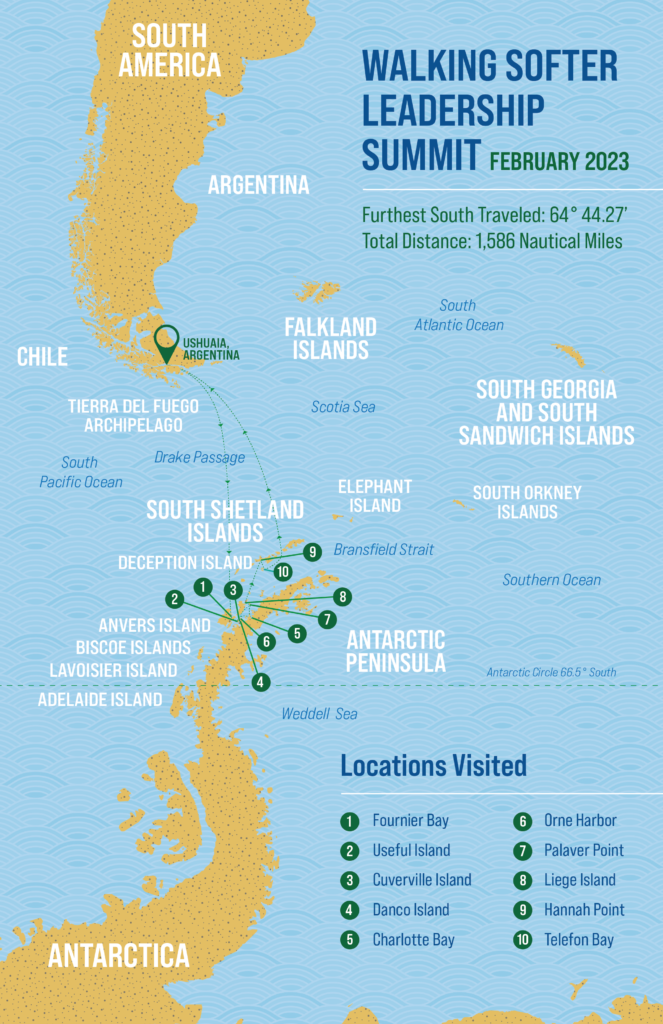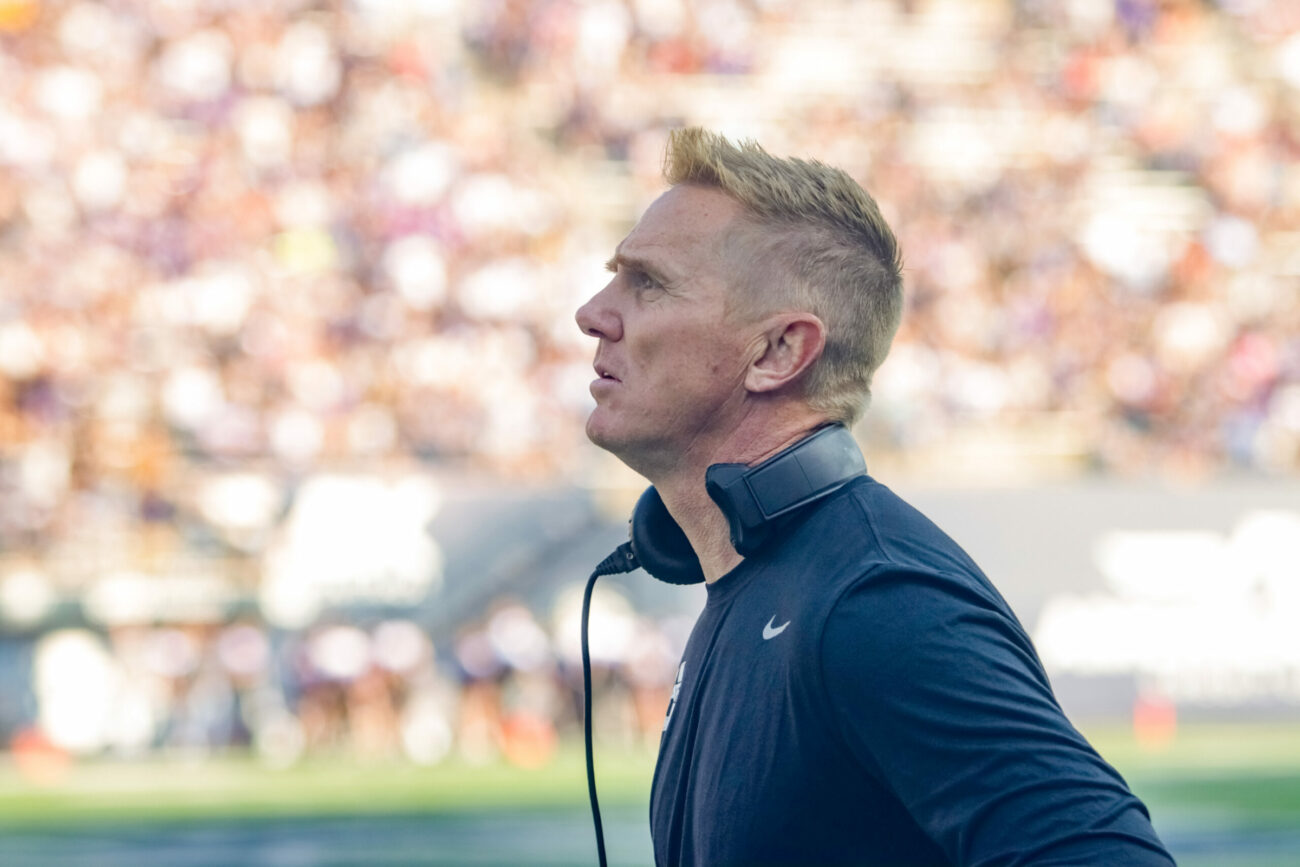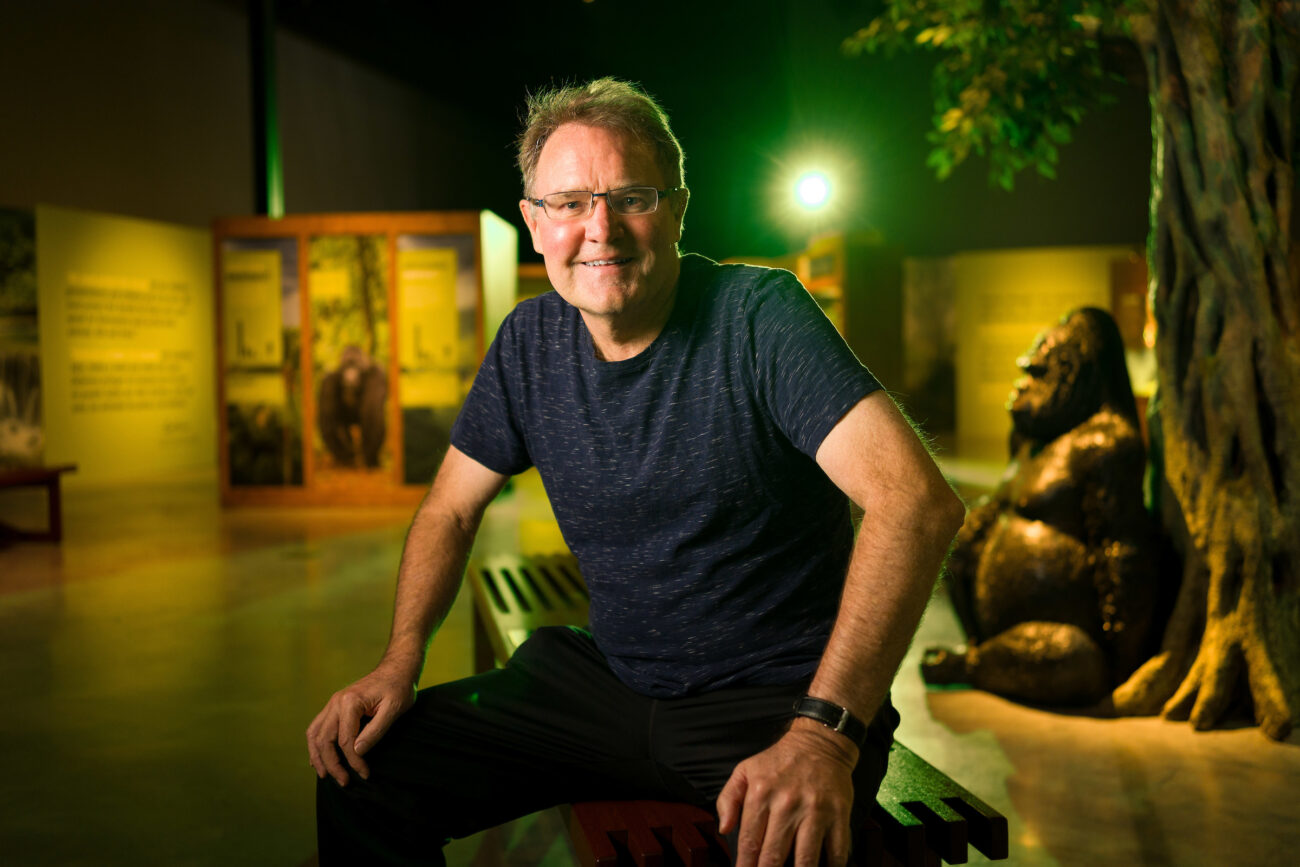USU Professor Inspires Creation of Billionaire Businessman’s Nonprofit, Travels to Antarctica for Leadership Summit
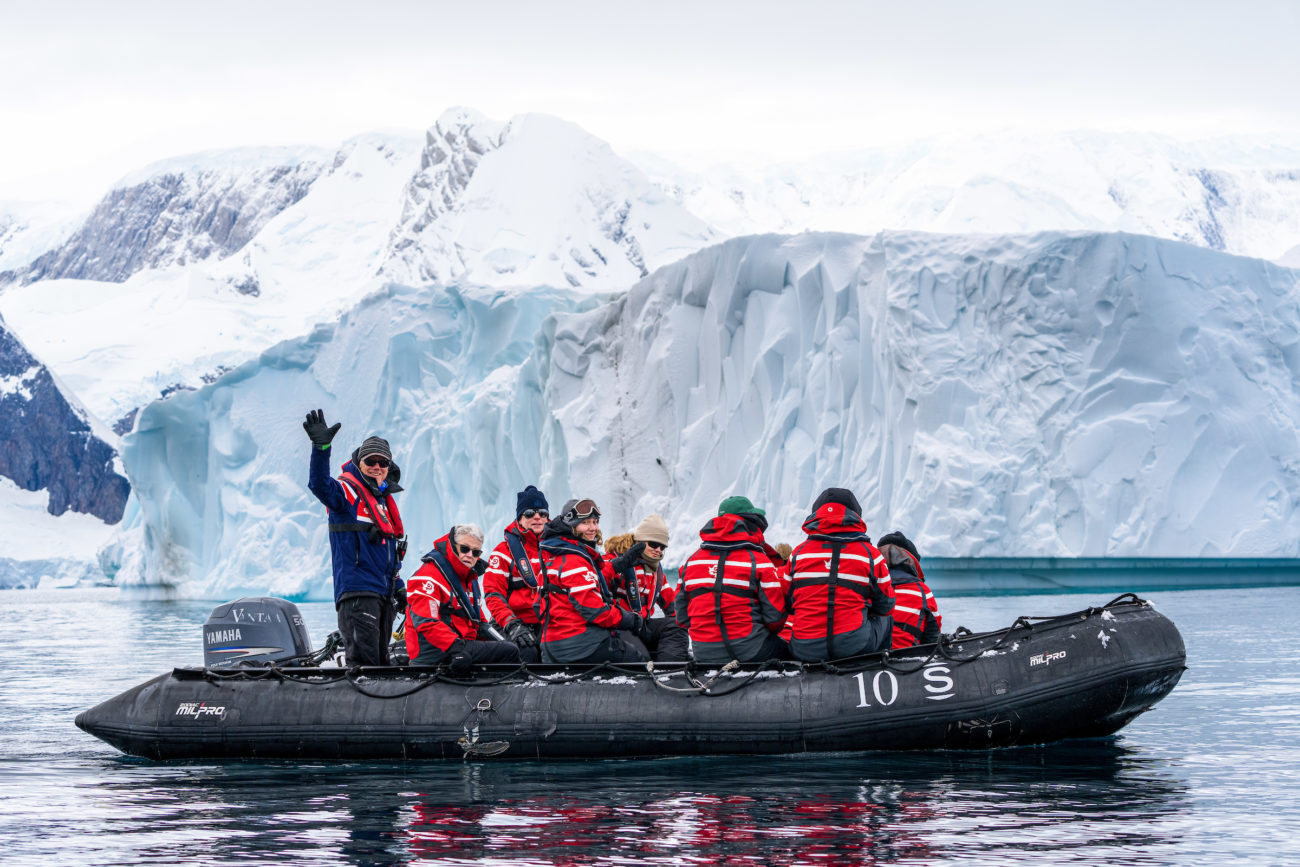
Physics professor Robert Davies and former student Jacob Alder share climate concerns on ‘surreal’ trip with Walking Softer
By Jeff Hunter ’96
Over the past few years, Utah State University physics professor Robert Davies has become accustomed to visiting remote areas of the world with small populations nestled below mountain peaks covered with snow and ice. But speaking about global environmental change and sustainable human systems in destination ski towns like Park City, Aspen, Bozeman, and Jackson Hole is one thing.
Visiting the world’s most inhospitable and desolate continent is another.
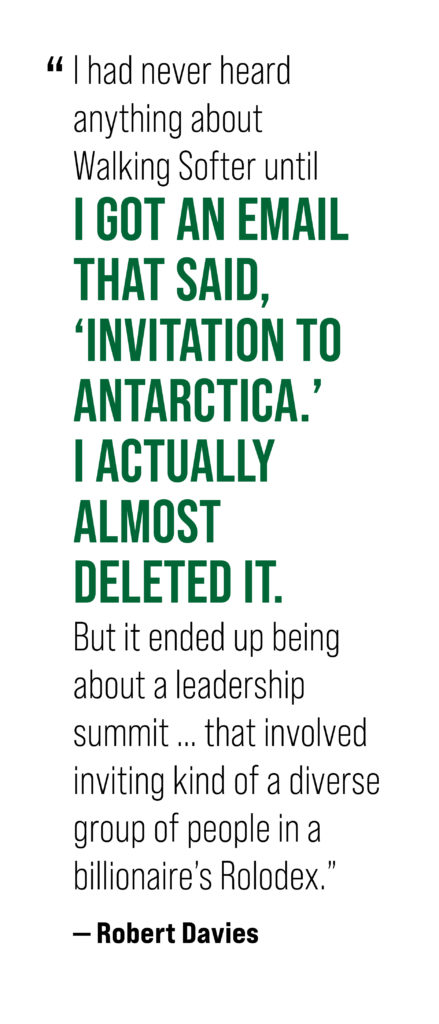
“It was almost indescribable just walking out on the deck of the ship every day and seeing icebergs and penguins, and whales and seals and albatrosses,” Davies says of his recent journey to Antarctica.
“It was just magical to be in their own environment where you’re a visitor, and they’re in charge.”
Davies’ trip to the Southern Hemisphere was an unusual one. He was one of about 100 people who were guests of billionaire businessman Vincent “Vinny” Smith and Walking Softer, a nonprofit group that Smith founded in the fall of 2020. According to the organization’s mission statement, Walking Softer’s goal is “to inform, inspire, and support change-makers to take bold and immediate action in the conservation and regeneration of our planet.”
A part-time resident of Jackson, Wyoming, Smith was in the audience when Davies made a presentation entitled “Resolution 2020: Action in a Time of Disruption” in January 2020. He didn’t know it until years later, but Davies helped motivate Smith to start Walking Softer with the aid of Ali Dunford, a local activist whom Smith met that same night.
“The presentation wasn’t the sole reason Vinny started Walking Softer,” says Walking Softer communications manager Taylor Cotton, “but it gave him the inspiration to continue his quest to create meaningful global change in regard to conservation and regeneration.”
It wasn’t until October 2021 that Davies discovered the impact that his talk in Jackson Hole had made on Smith, the former chairman and CEO of Quest Software and the founder of Toba Capital, a highly successful investment firm. That’s when he received a curious email from Walking Softer.
“I didn’t know Vinny, and I had never heard anything about Walking Softer until I got an email that said, ‘Invitation to Antarctica.’ I actually almost deleted it,” Davies says.
“But it ended up being about a leadership summit he was organizing that involved inviting kind of a diverse group of people in a billionaire’s Rolodex,” he adds with a chuckle.
Referred to as a “leadership summit,” the goal of Walking Softer’s trip to the Antarctic Peninsula was to bring together an eclectic group of about 50 individuals who the organization deemed as potentially influential in their efforts to combat climate change. The participants (and their “plus-ones”) included very successful people from the business world, as well as policymakers and high-level political advisors, and creative types like writers, actors and film producers and directors.
Everyone met in Buenos Aires in late February, then traveled to Ushuaia, Argentina, near the southernmost tip of South America. There the group boarded a ship – the Island Sky – which had been chartered by Smith, and sailed across the Drake Passage to the Antarctic Peninsula, where for the better part of six days, guides led daily excursions on kayaks and Zodiac inflatable boats to different locations to view the scenery and wildlife of the least-populated continent in the world.
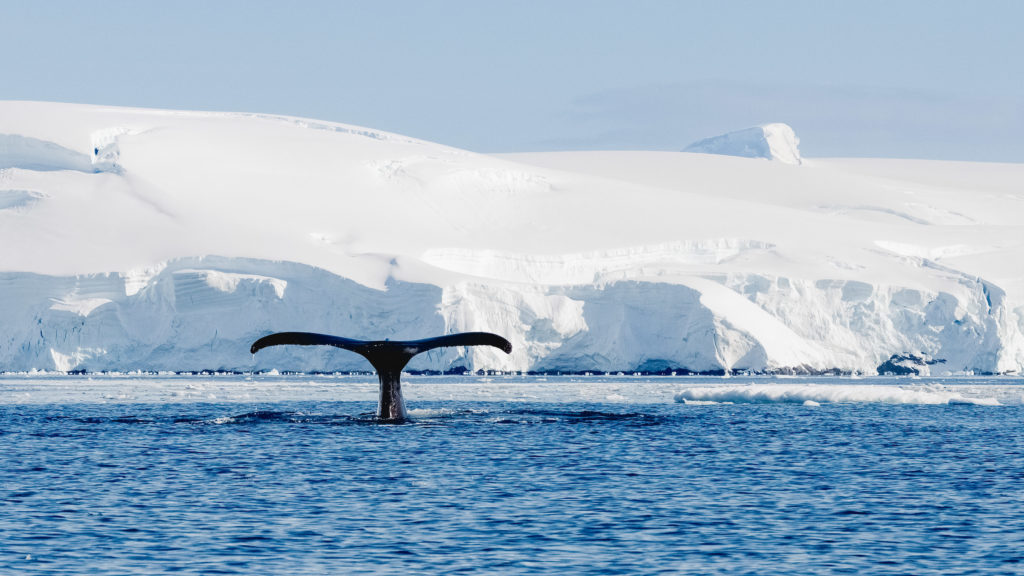
In between sightseeing jaunts amongst the bays, islands and inlets, experts on environmental issues like Davies shared presentations on the current and projected impact climate change is having on the Earth and its inhabitants with the captive audience aboard the Island Sky.
“At the inaugural Walking Softer Leadership Summit held in Antarctica, attendees were captivated by firsthand observations and insights into the tangible consequences of our evolving climate,” Cotton notes. “This immersive experience aimed to ignite a sense of urgency and empower participants to forge substantial global transformations, fostering a renewed commitment to environmental conservation and the restoration of our planet.
“During the voyage, guests were encouraged to reimagine their lifestyles and leadership approaches, with the shared goal of nurturing a sustainable and thriving planet.”
A Unique Opportunity
Due to the COVID-19 pandemic, Jacob Alder was unable to experience a typical commencement after graduating from Utah State University in 2020. And yet, in a very complicated game of “connect the dots,” Alder somehow managed to end up on a boat to Antarctica with a handful of billionaires, scholars and celebrities last spring.
“It was entirely surreal,” Alder says of the once-in-a-lifetime experience, “just so surreal.”
A Salt Lake City native, Alder came to college in Logan because “Utah State is sacred ground” to his family. But after originally seeking a degree in electrical engineering, Alder’s life — much like that of Vinny Smith — took an unexpected turn after hearing a three-hour lecture by Rob Davies as part of the Huntsman Scholar Program. Soon afterwards, Alder found himself pivoting towards a degree in economics as he headed into his junior year at USU.
“Rob has done a lot of research on all of these interconnected global systems that are in crisis mode, right now,” Alder says. “All of these interlocking systems — ecological, social, biological — that sustain the planet. And when Rob presented that to us, I was just floored and decided to change my major after having a conversation with him in his office.
“… I ended up taking one of his classes, and whenever he gave a talk on campus I would go listen to him. And I even ended up asking him to be a mentor on my honors thesis. He’s just such a smart guy, and kind of helped me make connections that I wasn’t able to make on my own.”
Following his graduation from USU, Alder and his wife, Zoe, relocated to Bloomington, Indiana, so she could attend law school while he pursued a master’s in public affairs at the O’Neill School for Public and Environmental Affairs at Indiana University. And fortunately for him, even while living in the Midwest, Alder and Davies stayed in touch.
Walking Softer’s invitation to Antarctica allowed Davies to bring along a person of his choice. And while normally that would have been his wife, Rebecca McFaul, the renowned violinist was already committed to perform a series of concerts in the Northeast with the Fry Street Quartet — the Logan-based ensemble Davies has partnered with for the long-running Crossroads Project.
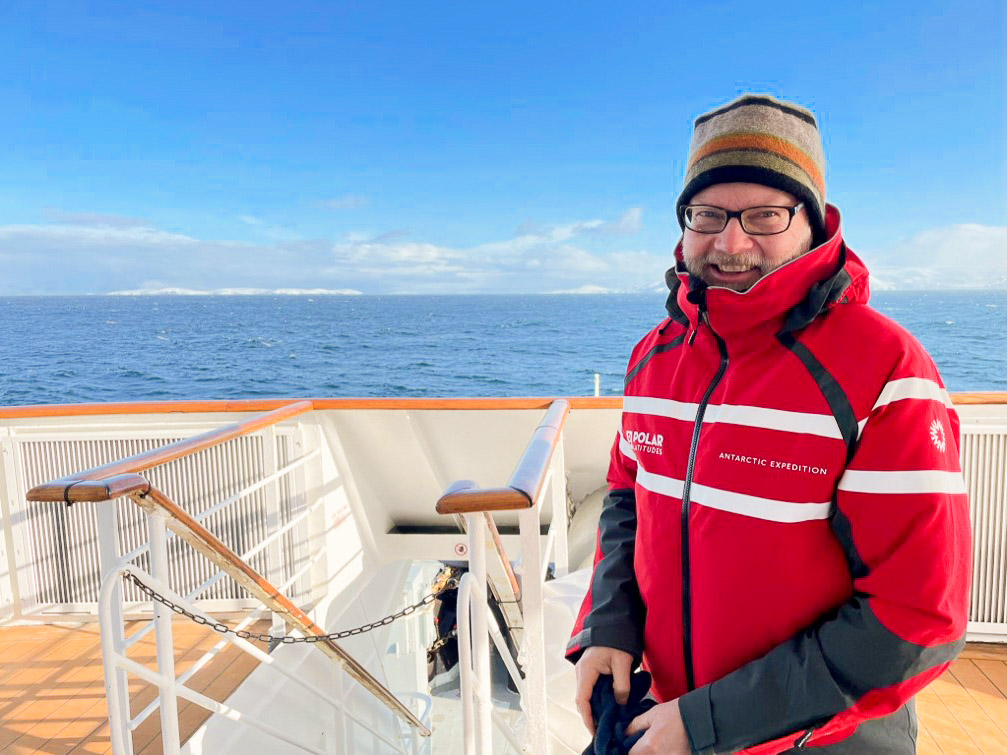
While talking over other options with McFaul, the couple both concluded that Davies should take along a student.
“And immediately, Jacob came to mind,” Davies says. “He’s a pretty special kid who brings both a youth perspective, as well as his environmental justice work. And we both thought introducing him to some real power brokers could have potentially good impacts down the road for all of his work.”
Once Davies informed his hosts whom he was bringing with him, they quickly asked if Alder could also make a presentation sometime during the 12 days the group would be at sea. He ended up giving a talk about environmental justice in front of a passenger lists comprised of billionaires and philanthropists, inventors and scientists, and farmers and film directors.
“It was kind of a bizarre group,” Alder notes with a smile. “But then, that was the point.”
Because they were in the northernmost point of Antarctica during summertime, the summit attendees were treated to relatively mild weather, primarily around 20 to 35 degrees, as they took in the unique wildlife and scenery primarily from the comfort of a very luxurious sailing vessel.
“Antarctica is a place that I’m super grateful I went to, but I don’t think I want to go back,” declares Alder, who completed his master’s degree at Indiana in May and is now working for a climate consulting firm in Washington, D.C.
“It was stunning and eye opening and the wildlife was so inspiring, but the circumstances and just the amount of investment to go to some place as remote as that was a humbling experience that I’m not sure I will have the opportunity to repeat. And if I had it — if some offered me the chance to go again — I think I would pass it along to someone else because it would just be selfish to go twice.”
A Carbon Investment
Rob Davies doesn’t travel as much as he used to. Since the pandemic led to a huge increase in the use of Zoom and other online platforms as a way of bringing people together, Davies says he’s backed off substantially when it comes to making presentations in-person.
“I rarely travel for work anymore; if I get invited to do a presentation, I push hard to do it on Zoom,” he says. “After COVID, we know how to do it. You can put someone on a giant screen on Zoom at a conference, and it can be every bit as effective. Occasionally, I’ll still go if it’s a longer conference, where there might be lots of interactions with people. Those are valuable. But I’m not going to fly across the country for one evening session when I can do it on Zoom.
“But with the summit in Antarctica, there was just no way to do that. It’s a hard thing. We’re just trying to make the best decisions we can.”
Despite the incredible opportunity to travel to one of the most remote locations on the planets, both Davies and Alder admit that they struggled to make the decision about attending the Walking Softer Leadership Summit due to their knowledge of the cost in carbon emissions. Davies says that Walking Softer purchased carbon offsets prior to the trip, but he says while offsets are not “worthless,” he also believes “at this stage of the game, the climate doesn’t care about offsets. The climate only cares about molecules going into the atmosphere.”
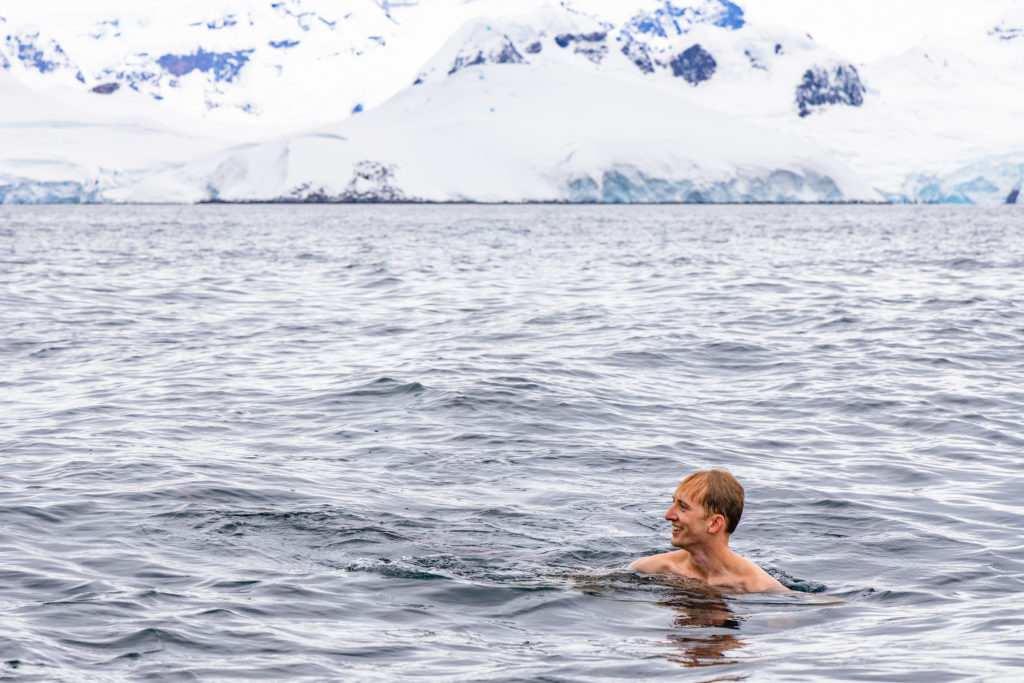
According to Alder’s calculation of his own carbon emissions, his journey by airplane to Argentina, followed by the ship voyage on the Island Sky and short excursions around the Antarctic Peninsula, was akin to 11 months’ worth of use of his water heater, oven, lights, air conditioner, etc., at his apartment in Indiana.
“So, basically going to Antarctica for two weeks added on like a whole extra year of life for me living as a grad student,” Alder acknowledges.
In addition to the daily presentations by experts, both Davies and Alder seemed optimistic that some of the less formal interactions and conversations with their fellow attendees in the dining and lounge areas will lead to significant dividends. Davies says research shows the average American’s carbon footprint is about 41 tons per year, but that the top 1 percent of the country’s wealthiest people have an average footprint of 250 tons.
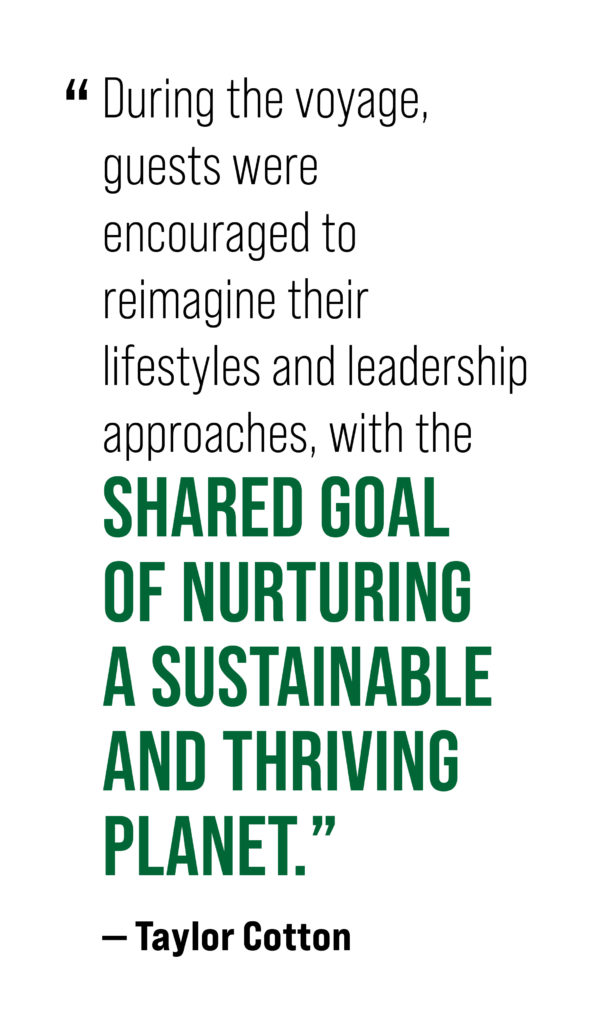
Certainly not everyone on the Island Sky fell into that demographic, but Davies feels that reaching some of those people who might have “massive, hyper-consumptive lifestyles” involving multiple homes, large corporations, and private jets, made the trip worthwhile. Not to mention potentially impacting policy makers and media creators.
“I thought, Should I do this?” Davies admits following a deep exhale. “I really wanted to go. It was an amazing opportunity. But this is a huge footprint.
“In the end, the calculation I made was that the people who were going to be on the trip have some outsized influence, if they are motivated. And so, in my mind, I categorized it as a carbon investment. So, you spend it upfront in hopes of a big payoff down the road.”
Davies points out that earlier in the week he received an email from a woman who had attended one of his presentations more than three years ago in Breckinridge, Colorado. Similar to Vinny Smith, she had been so affected by his talk that she “started a whole business around addressing these ideas.”
“I’m sure some of the people will be just less impacted than others,” Davies says of those he encountered in Antarctica. “But I suspect that out of the 100 people that were there, a fair number really took away something from it.”
